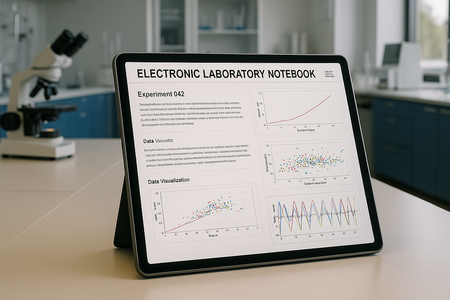
The mechanical properties determined using various testing methods (e.g., tensile and fatigue testing, cyclic and static indentation), microstructural features (e.g., grain size, phase content), and physical properties (e.g., electrical conductivity, magnetic permeability) offer significant potential for exploring correlations in materials datasets. Data visualization and analysis are essential to uncover these correlations.
A major challenge in leveraging this potential is the lack of accessible, low-threshold concepts for research data management strategies based on Electronic Laboratory Notebooks (ELNs) (in collaboration with TA-WLE), as well as the application of appropriate metadata schemas based on established ontologies (in collaboration with TA-SAI).
IUC08 addresses these challenges by developing best-practice concepts to support the transition from traditional paper-based lab notebooks to ELNs.
| Main requirements: - Integrate data management: Use and adapt FAIR data documentation and management across multiple testing methods: e.g., tensile, creep and fatigue testing, micro- and nano-indentation, Light microscopy, SEM/FIB and XRD - Automatized implementation of meta-data schemas developed in NFDI-MatWerk in ELNs - Implement visualization for interactive visual exploration and analysis of materials datasets - Develop correlation analysis techniques: Systematize and enhance correlation analysis techniques for materials data, including error control. - Establish best practices: Define, test and enhance data handling, analysis and visualization. - Develop RDM infrastructure in collaboration with the computing center. - Standardize Data Formats: Define and implement standardized (meta)data formats based on NFDI-MatWerk ontologies in collaboration with IUC02, IUC10, IUC12, IUC14 |
| Main Task Area: TA-WLE Other related Task Areas: TA-CI, TA-SAI |
| Possible connections within NFDI: NFDI4Ing, FAIRmat |
| Material/Data: - Microstructure of metallic alloys - Mechanical and physical properties of metallic alloys - Metadata (material history and testing methods) of metallic alloys |
| Main Success Scenario: Broad implementation of fully digital, FAIR data handling in daily lab work using ELNs, associated, e.g., Python-based evaluation / visualization tools and appropriate data schemas. |
| Added value for the MatWerk community: Fostering low-level-entry concepts for digitization of lab work on a “low entry level” |
NFDI-MatWerk
Funded by the Deutsche Forschungsgemeinschaft (DFG, German Research Foundation) under the National Research Data Infrastructure – NFDI 38/1 – project number 460247524.
NFDI-MatWerk
Funded by the Deutsche Forschungsgemeinschaft (DFG, German Research Foundation) under the National Research Data Infrastructure – NFDI 38/1 – project number 460247524.
Subscribe to our newsletter for regular updates about materials science topics!
After subscribing, you will receive an email from us with a confirmation
link.
Only after clicking this link your registration is completed.